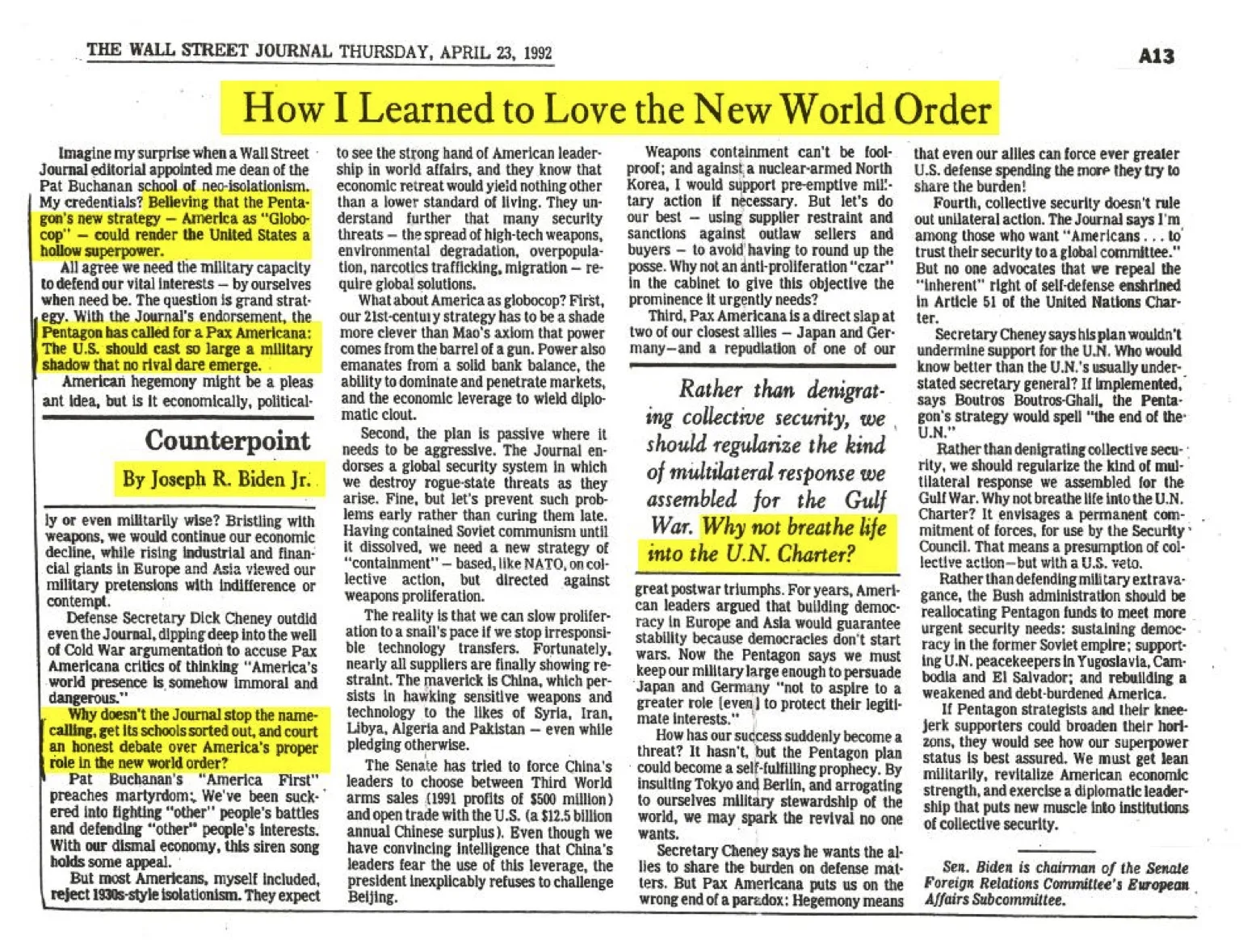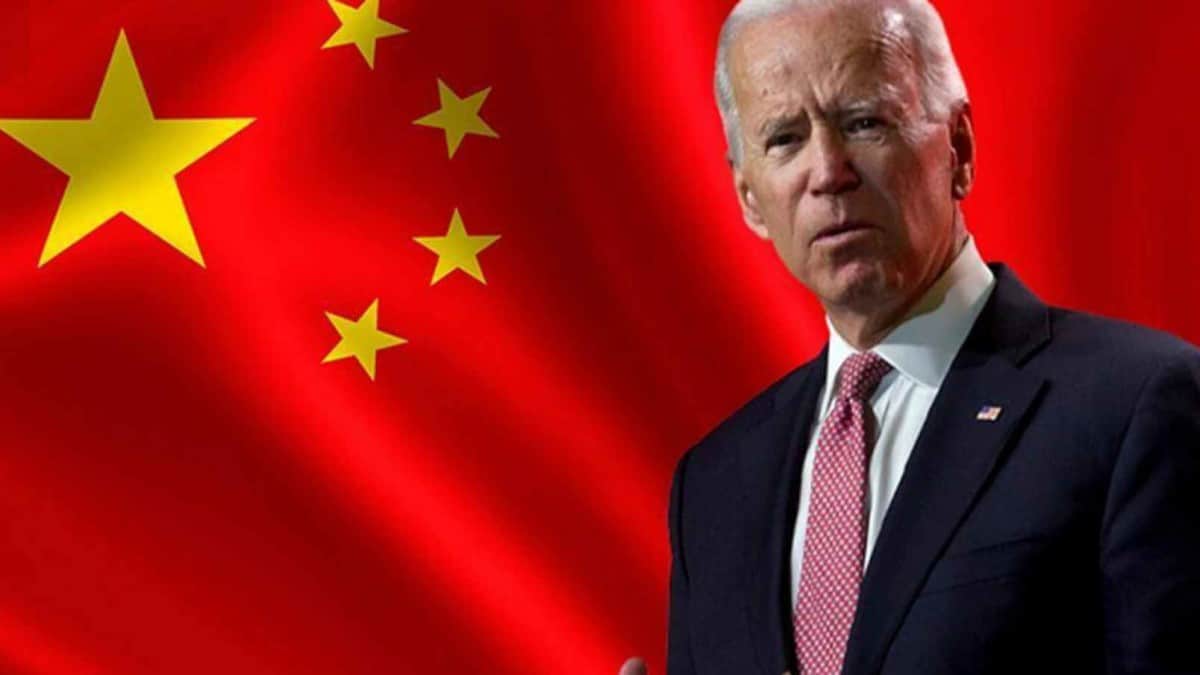 American Patriot Contact Tracers
American Patriot Contact Tracers In 1992, long before he wrote the Patriot Act, Joe Biden expressed his love for the New World Order in a recently unearthed Wall Street Journal essay. Reposted from NewsPunch
In an article entitled, “How I learned to love the New World Order,” Biden outlines his plans to destroy national sovereignty, establish a one world government, and “breath new life into the U.N. Charter.”

Truthandaction.org reports: A classic case of ‘hiding out in the open’. They don’t have much of a choice since it is quite obvious that they would want nothing more than to kill of our nation’s sovereignty and join the elite as ‘rulers of the world’.
Anytime someone calls you a conspiracy theorist because you assert that there is a global elite that wants to dissolve the borders of all nations in an effort to bring the world under one ruling body, show them this:
Here’s Biden’s testament:
How I Learned to Love the New World Order
Abstract (Summary)
Joseph R. Biden Jr defends his view that the Pentagon’s new strategy which appoints the US as a sort of world monitor could render the US a hollow superpower. Biden explains why he reacted the way he did to the plan.
____________
Imagine my surprise when a Wall Street Journal editorial appointed me dean of the Pat Buchanan school of neo-isolationism. My credentials? Believing that the Pentagon’s new strategy — America as “Globocop” — could render the United States a hollow superpower. All agree we need the military capacity to defend our vital interests — by ourselves when need be. The question is grand strategy. With the Journal’s endorsement, the Pentagon has called for a Pax Americana: The U.S. should cast so large a military shadow that no rival dare emerge.
American hegemony might be a pleasant idea, but is it economically, politically or even militarily wise? Bristling with weapons, we would continue our economic decline, while rising industrial and financial giants in Europe and Asia viewed our military pretensions with indifference or contempt.
Defense Secretary Dick Cheney outdid even the Journal, dipping deep into the well of Cold War argumentation to accuse Pax Americana critics of thinking “America’s world presence is somehow immoral and dangerous.
“Why doesn’t the Journal stop the namecalling, get its schools sorted out, and court an honest debate over America’s proper role in the new world order?
Pat Buchanan’s “America First” preaches martyrdom: We’ve been suckered into fighting “other” people’s battles and defending “other” people’s interests. With our dismal economy, this siren song holds some appeal.
But most Americans, myself included, reject 1930s-style isolationism. They expect to see the strong hand of American leadership in world affairs, and they know that economic retreat would yield nothing other than a lower standard of living. They understand further that many security threats — the spread of high-tech weapons, environmental degradation, overpopulation, narcotics trafficking, migration — require global solutions.
What about America as globocop? First, our 21st-century strategy has to be a shade more clever than Mao’s axiom that power comes from the barrel of a gun. Power also emanates from a solid bank balance, the ability to dominate and penetrate markets, and the economic leverage to wield diplomatic clout.
Second, the plan is passive where it needs to be aggressive. The Journal endorses a global security system in which we destroy rogue-state threats as they arise. Fine, but let’s prevent such problems early rather than curing them late. Having contained Soviet communism until it dissolved, we need a new strategy of “containment” — based, like NATO, on collective action, but directed against weapons proliferation.
The reality is that we can slow proliferation to a snail’s pace if we stop irresponsible technology transfers. Fortunately, nearly all suppliers are finally showing restraint. The maverick is China, which persists in hawking sensitive weapons and technology to the likes of Syria, Iran, Libya, Algeria and Pakistan — even while pledging otherwise.
The Senate has tried to force China’s leaders to choose between Third World arms sales (1991 profits of $500 million) and open trade with the U.S. (a $12.5 billion annual Chinese surplus). Even though we have convincing intelligence that China’s leaders fear the use of this leverage, the president inexplicably refuses to challenge Beijing…READ FULL ARTICLE HERE… – American Patriot Contact Tracers





